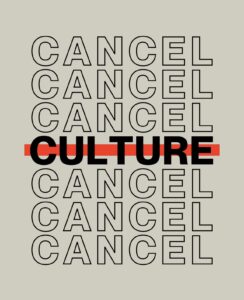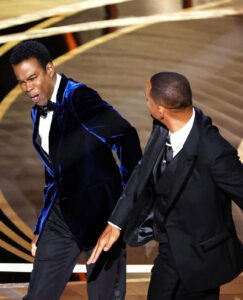Cancel Culture vs. Accountability: Where Do We Draw The Line?
Published on April 15, 2025, at 10:02 a.m.
by Evie Feinour.
If you’re living in the 21st century, there’s a good chance you’ve heard the term “cancel culture” tossed around in conversations about social media, politics and celebrities. But what does it really mean—and where did it come from?

According to the Pew Research Center, the phrase “cancel culture” is believed to have originated from 1980s slang, when “cancel” was used to describe breaking up with someone as well as traces to black and queer communities. Since then, the term has evolved through film, television, and most prominently, social media to take on the meaning it holds today. The Pew survey and article note that while many people are familiar with cancel culture, opinions vary widely on what it actually is. Is it a tool for holding people accountable? A social tactic used to unfairly punish others? Does it stifle free speech—or does it even exist at all?
Accountability vs. “Cancel Culture”: How Are They Different?
The Pew survey, published in 2021, asked the 44% of participants who stated they were aware of “cancel culture” how they personally define the term. The most common theme among the responses was that “cancel culture” describes actions that are taken to hold others accountable. But there is a large debate about the relation and difference between accountability and “canceling” someone.
Jennifer Forestal, political researcher and professor at Loyola University Chicago, states that she believes the difference between productive public shaming — accountability — and harmful public shaming — cancelation — is “whether or not the ‘cancelled’ person has a chance to apologize and be forgiven.” She goes on to explain that, to her, the distinction is about intent: “Do we want people to acknowledge and atone for their mistakes? Or is the goal to exile or ostracize them for making a mistake? If it’s the latter, I think we’ve crossed into something maybe a little more problematic.”

Our America, an organization aimed toward “unit[ing] communities around a sense of pride in America” lists several reasons why accountability is different from “cancel culture.” The first reason stated is that “holding people accountable for their actions means their punishment should be tied to the action they took.” For example, some might argue that actor Will Smith was “canceled” following his infamous Oscar slapping incident in 2022, but Our America states that his punishment of a 10-year ban from the award show for violating the show’s rules shows accountability. Whereas if Smith’s movies and television features were simply just removed from all streaming services following him striking Chris Rock’s face, the aftermath may have qualified as “cancelation.”
When I asked Dr. Jennifer Forestal how we can ensure that calls for accountability don’t devolve into public shaming or silencing dissenting opinions, she explained that there are several different levels of accountability: “you can be legally accountable for something, but you can also be held accountable in a less formal way, through social norms.” She used the example of someone spewing purposeful, hateful ideas to explain that she doesn’t believe the government should get involved or arrest that individual because she “think[s] it’s really bad when states get involved with deciding what is acceptable speech and what isn’t.” However, she does believe society has the ability to shame or even silence that person within their own communities. She explained that this is because social norms “are less formal, … more fluid, and there’s less at stake involved in violating them.” This means that people aren’t inherently telling others they can’t say certain things — instead, it’s telling them, “you can’t say that and still enjoy our respect.” Rather than governmental consequences, there are social consequences. While those can sometimes result in harsh public shaming, Forestal believes it is crucial that these social norms about what is acceptable versus what is not should be contested, questioned and challenged, instead of being “set in stone.”
Does “Cancel Culture” Violate Free Speech?
Lane McLelland, executive director of the Crossroads Civic Engagement Center and a professor of Speaking of Freedom—an honors course at the University of Alabama that explores free speech and cancel culture—said she often hears people claim that cancel culture violates free speech, but she disagrees. “‘Cancel culture’ is a social phenomenon, not a government phenomenon,” McLelland said. While she acknowledged that the fear of being canceled may discourage some people from speaking freely, she emphasized that it does not violate the First Amendment.
Freedom Forum, a nonpartisan organization dedicated to “fostering First Amendment freedoms for all,” corroborates Dr. McLelland’s statement, saying “the First Amendment only protects against the government punishing speech and doesn’t apply to what private individuals do.” But, also states that it instills a fear of being canceled, which in turn causes people to self-censor, stifling public discourse and discussion.
Interestingly, Dr. McLelland mentioned that in her Speaking of Freedom class, many students have also brought up their “freedom not to speak” and how, in some ways, social media users — and the culture of the apps themselves — expect people to speak up or comment on certain issues. This creates an almost chilling effect, as Dr. McLelland explained that her students felt as though they couldn’t “win,” for lack of a better term. They described the cycle as follows: “Why are you silent? And then when you speak out, then it’s, why are you speaking on something you don’t know about?” Overall, while there can be fear and inhibition surrounding speech and expression, there is no true “violation” due to “cancel culture.”
Celebrities and Brand Cancellations
While “cancel culture” can affect everyday individuals, it more commonly impacts celebrities and public figures due to their visibility in the spotlight. Additionally, the accessibility of information and the ability to express opinions on social media have played a major role in the rise of public shaming seen so often today. Whether it involves large brands or public creators, the scrutiny of the public eye and the speed at which information spreads can be extremely damaging to their reputations.

There are countless examples of brands and individuals facing severe backlash for their actions, words or decisions. In 2020, Aunt Jemima, the well-known syrup brand, faced intense criticism amid nationwide protests against systemic racism due to the racist themes associated with its name, image and origin story. In response to the overwhelming backlash and public fallout, PepsiCo, the brand’s parent company, changed the name to Pearl Milling Company and removed all original imagery from the packaging. A few years earlier, Kevin Hart came under serious fire for homophobic tweets that resurfaced shortly after he was announced as the host of the 2018 Oscars. Subsequently, his offer to host the prestigious award show was rescinded. However, unlike many other celebrities who have faced similar situations, Hart’s apology and public relations strategy helped him maintain a strong approval rating among the public.
How PR Practitioners Deal With “Cancel Culture”
While “cancelation” may sound like an “end all be all” to someones career, the truth is there are strategic ways individuals have been able to bounce back from scandals similar to those listed above. There are specific steps and strategies public relations pracititioners take in order to regain public trust and approval.
PR Daily suggests that to prevent cancellation altogether, it’s important for PR practitioners to know their brand or client’s audience and understand their expectations. The publication emphasizes the importance of one’s personal brand and how actions reflect that identity. For example, if one’s brand is built on kindness and empathy, their behavior should consistently reflect those values to avoid serious backlash or public shaming.
But in the event a brand or individual finds themself in the center of controversy facing public backlash, there are certain things PR specialists often do to descalate a situation. In the age of “cancel culture” it is crucial that brands act quickly, genuinely acknowledge their mistakes, and take action to address the issue at hand. ReputationToday states that monitoring public sentiment, responding in a timely manner, aligning brand values with societal expectations, and working to build long-term trust following a specific situation are all crucial steps practitioners should carefully consider when making decisions in the era of “cancel culture.”
In today’s hyper-connected world, the line between accountability and “cancel culture” is often blurred. While the term continues to spark debate, one thing is clear: public scrutiny isn’t going anywhere. Whether it’s individuals, celebrities or brands, navigating this landscape requires a thoughtful balance of authenticity, responsibility and responsiveness. As experts point out, being canceled is not always the end—it’s often a turning point. With the right approach, rebuilding trust is possible. Ultimately, cancel culture challenges us to reflect on what kind of society we want to be: one that shuns mistakes, or one that values growth, dialogue and genuine accountability.



